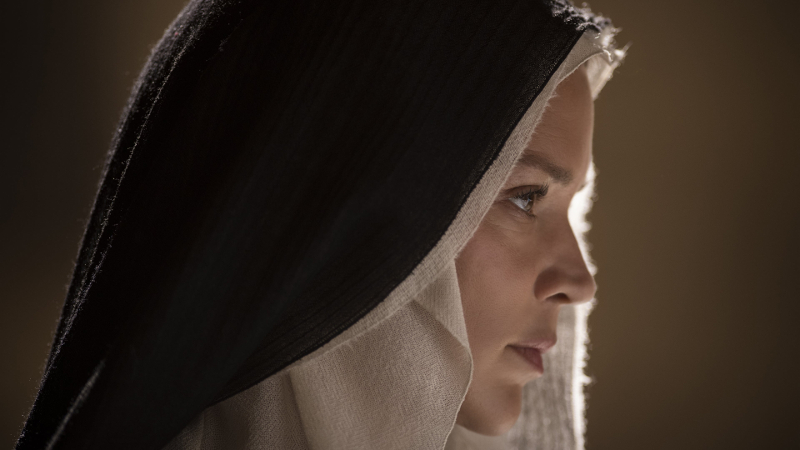Director – Paul Verhoeven – 2021 – France – Cert. tbc – 131m
*****
A 17th Century nun subject to religious visions embarks on a lesbian relationship with a novice – exclusively on MUBI from Friday, July 1st
Christianity. The Church. Religion. Treat them the wrong way, and you can get into trouble. Horror The Exorcist (William Friedkin, 1973), drama The Devils (Ken Russell, 1971) and comedy Life Of Brian (Terry Jones, 1971) remain controversial. Lesbian nun relationship drama Benedetta may be about to join their ranks. Or perhaps times have moved on. The film is apparently based on a real 17th Century case.
As a young girl, Benedetta (Elena Plonka) claims to commune with the Divine – convincingly so, too, enough to suggest to a bandit gang about to rob her parents and her that a chirping bird is God’s voice, especially when said bird deposits excrement in the eye of the bandit leader who promptly returns a gold necklace to Benedetta’s mother.
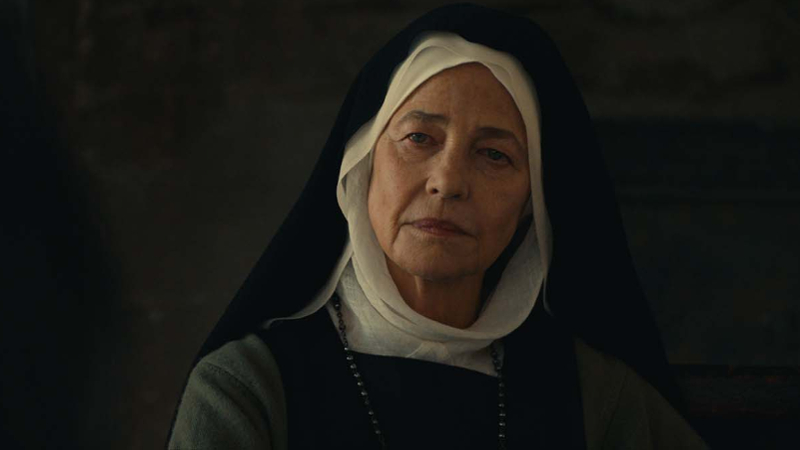
On arrival at the convent in Pescia, Benedetta’s father (David Clavel) must pay the Reverend Mother (Charlotte Rampling who seems to have cornered the market in Reverend Mothers judging by Dune, Denis Villeneuve, 2021) a dowry to enable his daughter to become a novice, which suggests that the institution, like the wealthy Catholic Church under whose umbrella it exists, may have ignored Jesus’ injunction to sell all you have and give to the poor. Benedetta herself is less than happy to wear itchy clothing and less happy still to surrender her personal, devotional BVM (Blessed Virgin Mary) statuette. So she prays to a full-sized BVM statue, which falls on her. Not only is she miraculously not crushed, the BVM’s exposed breast comes within reach of her hand before she is rescued. A hint of what is to come.
18 years later, a woman fleeing her abusive shepherd father is admitted to the convent when Benadetta’s shocked, visiting parents offer the money for the woman to become a novice. Bartolomea (Daphné Patakia) and Benedetta (Virginie Efira) have a rocky road ahead. When Bartolomea causes a nun to drop bobbins into a boiling cauldron, Benedetta orders her to fish them out, scalding her hand. Later, while the nuns are singing in chapel, Bartolomea starts feeling Benedetta up from behind, causing her to have a vision.
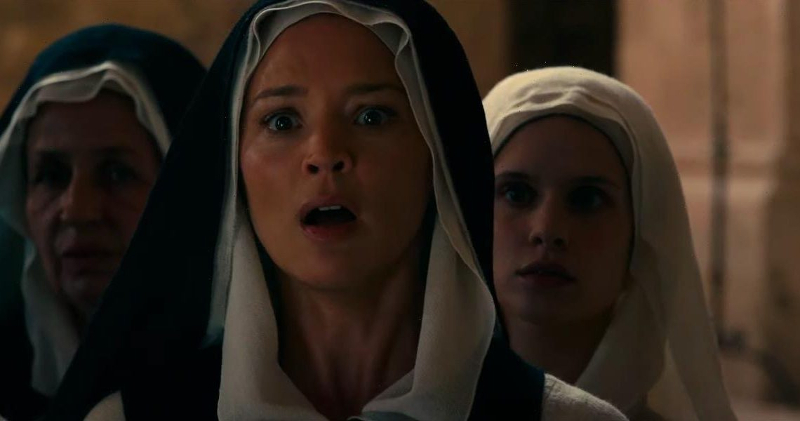
The visions in this film are arresting. Visually they recall classical paintings of Biblical and extra-Biblical scenes. In one, serpents advance towards Benedetta, crawling up her legs, up her shift until Jesus turns up and beheads them with his sword. In another, she is about to be gang raped by the opening scene’s bandits when the sword-wielding Jesus beheads some or cleaves the heads of others in two. Again, anyone doubting that this is the Jesus recorded as saying, “he who lives by the sword shall die by the sword” is more convinced when this turns out not in fact to be Jesus but another rapist.
Following a penetration-by-hand, sex scene in which Benedetta begs Bartolomea to “go deeper”, the latter carves the lower half of Benedetta’s confiscated BVM into a phallus. We’ve visited this montage sex and religion before – the nuns cavorting all over a statue of Christ in The Devils, the crucifix masturbation in The Exorcist. Remove the religious element and all this feels a lot like parts of the similarly sleazy The Handmaiden (Park Chan-wook, 2016).
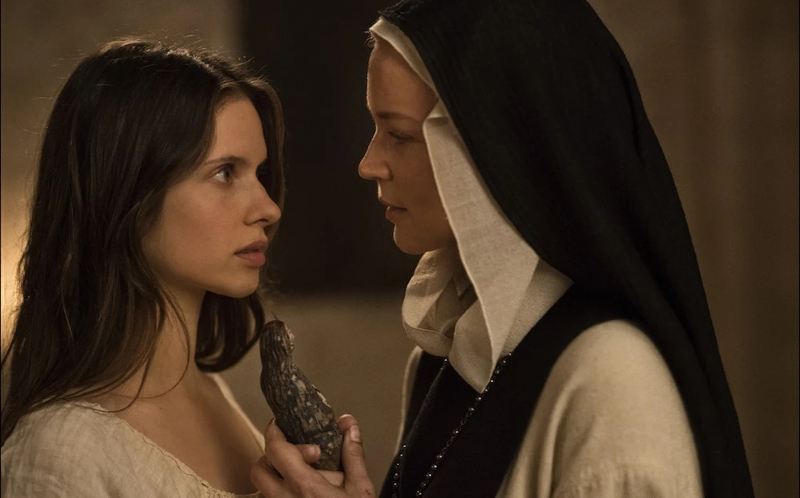
Verhoeven has long been a provocateur. In Hollywood, he had a lot of fun playing with violence (Robocop, 1987; Starship Troopers, 1997) and sex (Basic Instinct, 1992). However, he seems happier working in less puritanical Europe.
His heroine here is a woman in a world where options for women are few. You could certainly argue that Benedetta’s stigmata are faked, as Bartolomea does, but what are we to make of her bleeding hands and feet after a vision in which Jesus on the Cross asks her to come closer, untie his loin cloth and press her hands and feet against his so that she received imprint wounds of the nails? Attempting to determine the authenticity of Benedetta’s visions, the Reverend Mother questions why Benedetta didn’t also have a forehead imprint of the crown of thorns.
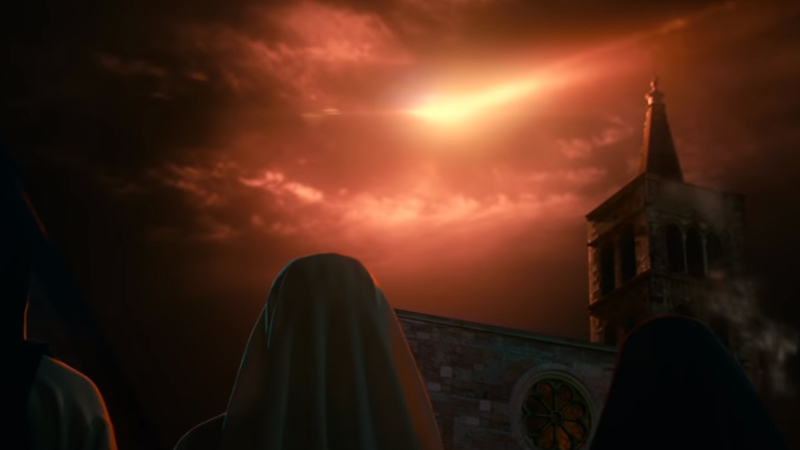
Although sympathetic to Benedetta who ascends from novice to Reverend Mother, usurping her through not scheming but vision-led validation of her own religious authority, Verhoeven clearly doesn’t object to the idea of two nuns in a lesbian relationship, especially when the other woman has previously been subjected to considerable male sex abuse.
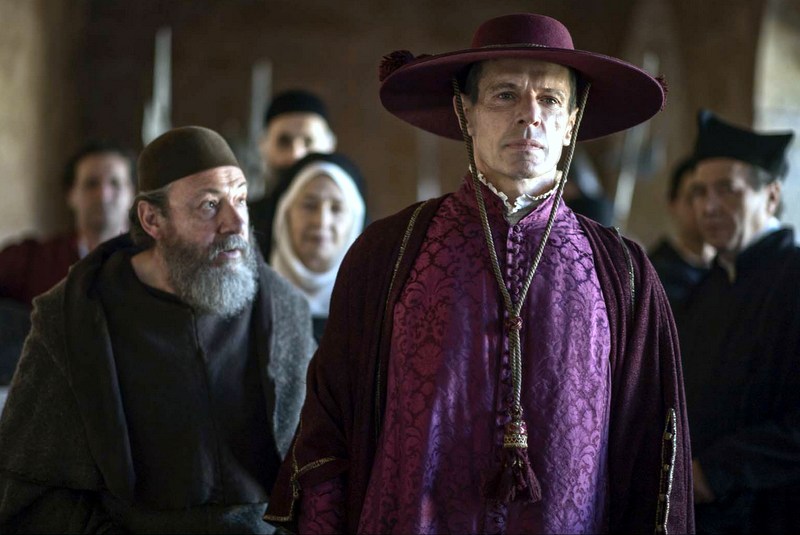
He is less charitable to the official religious authorities, though. When the Papal Nuncio (Lambert Wilson) insists on entering the plague-free Pescia through the city gates against the wishes of Benedetta, he brings the plague with him – an episode with particular resonance given the recent (current) pandemic. His treatment of the Reverend Mother is more nuanced. She appears to be part of a dynasty, with daughter Christina (Louise Chevillotte) lined up as successor, but acquiesces to Benedetta.
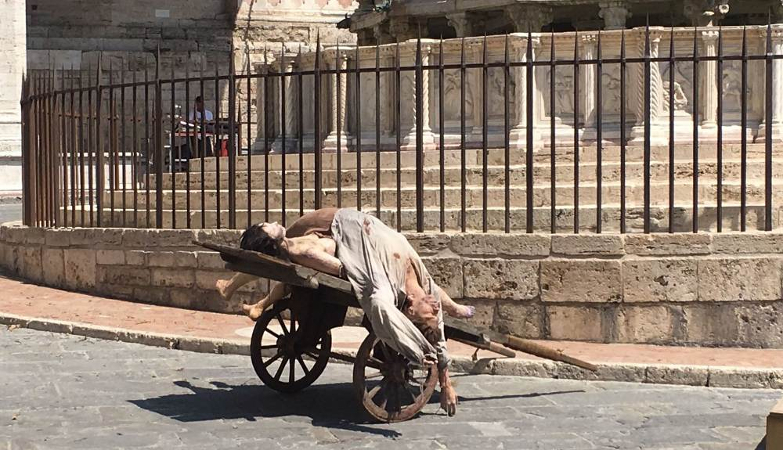
Directors making films like this have a definite air about them of children misbehaving, and Verhoeven is clearly being very naughty here. The film is at once torrid and a visual tour de force, sexploitative and serious about religion, a potboiler and a measured historical epic. There was nothing here that I personally found offensive, although some might find its portrayal of nuns as sexually active to be beyond the pale. It’s a very rich and strange film, Verhoeven on top form, with an awful lot in it; a film likely to repay dividends on multiple viewings.
Benedetta is exclusively on MUBI from Friday, July 1st.
Teaser trailer:
Trailer:
2022
UK Cinemas from Friday, April 15th
Exclusively on MUBI from Friday, July 1st
2021
Benedetta played in the BFI London Film Festival 2021 which ran from Wednesday, October 6th to Sunday, October 17th in cinemas and on BFI Player
